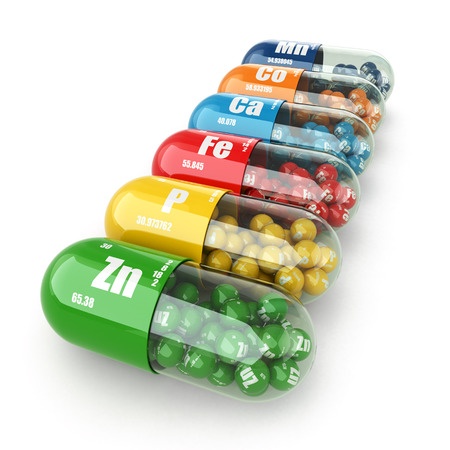About Vitamins and Minerals for Over Age 40
For many of us our health goals are not just based on fitness, or on longevity, but on a combination of both. A very important way of ensuring we maintain our health, whatever our general physical condition and whatever our age, is by eating the right foods and getting the right vitamins and minerals.
Let’s look at the benefits of vitamins and minerals have after we turn 40. Vitamins and minerals are key to staying in the best health we can be in for as long as is physically possible.
There is no doubt that vitamins are important to a healthy body as we age. They boost the immune system, help keep the nervous system healthy, and help turn food into energy.
Minerals hold an important key to achieving our maximum potential longevity. When the right minerals are in our bodies in the right amounts, our cells are able to work to the best of their ability, our telomeres stay long, and our genes are allowed to express themselves the best way they possibly can. On the other hand, when we are deficient in some of the key minerals for longevity, the genes that are responsible for keeping our cells healthy and making us live longer will not be active and we will not enjoy our maximum potential.
A good way of understanding vitamins and minerals is to think of them not as extras, but as essentials, like water. Much the same way we can survive without water for a day, or on reduced water for a very long time, we can survive on limited vitamins and minerals for a long time also. However, just like when we dehydrate ourselves, when we fail to consume enough vitamins and minerals our bodies begin to suffer and we may find that our health is significantly worse than it would have been otherwise.
The top 7 Vitamins and Minerals you should be taking if you are over 40:
Vitamin A
Vitamin A is amazing for balancing our immune system, which can weaken over time. Whereas many immune-boosting supplements can make inflammation or autoimmune conditions worse, as they act by making white blood cells more powerful, vitamin A focuses on quality over quantity, regulating the immune system, fighting illness and autoimmune complaints at once.
B Vitamins
B vitamins are all essential to maintaining proper cognitive function. B vitamins act by transforming ketones and glucose in our blood into Adenosine Triphosphate (ATP), the energy our cells need to function properly every day. All B vitamins boost our immune system. They also fight the effects of stress from mental or physical activity, which becomes greater after age 40, making sure we are comfortable and our mood is elevated.
Vitamin C
Vitamin C is always a great choice when it comes to an antioxidant vitamin. It doesn’t reverse the signs of ageing itself, but it does attack free radicals, stopping them from doing any further damage. From that point onwards the cells may regrow to an extent, regaining some of their health.
Iron
Iron is essential on its own, and in conjunction with vitamin C, to promote longevity. Many people assume that the antioxidant powers of vitamin C are all down to the vitamin itself. But that is incorrect. Iron helps the antioxidant powers of vitamin C to take effect, helping us reverse the damage done by free radicals and encourage our cells to become and remain youthful.
On its own, Iron is indispensable, as it carries oxygen throughout our bodies and fights fatigue.
D Vitamins
Vitamin D is a great antioxidant for the opposite reasons to vitamin C. Not only does it fight free radicals, but is key to many hormonal, immune, and muscular processes which are associated with a longer, healthier life. By keeping our organs working better for longer, our immune systems strong against disease, and our muscles packed with useful protein and glucose, vitamin D ensures we are ready for any challenge.
Vitamin D3 is an amazing help when you suffer depression. D3 is a hormonal regulator, which means that it helps our body to produce the right hormones at the right time. Many people do not get enough vitamin D3, as it is largely produced by exposing ourselves to sunlight, so we need to make the most of it every way we can.
Magnesium
Magnesium is essential to cell transport, which is getting cells around our body. If we don’t have enough magnesium then we will not be able to absorb and use vitamins.
Zinc
Zinc is another mineral which is essential to keeping our cells working to the best of their ability and promoting longevity. Literally every organ in our bodies works better when we consume enough zinc. Most importantly, our livers and kidneys work far better. This is important because a good liver cleans your body of toxins, and good kidneys will flush these toxins out. When toxins are allowed to build up in the body they degrade us from the inside out, promoting an acidic diet and shortening our lives. On the other hand, when we flush out enough toxins we allow our bodies to heal and we move towards better health and longevity.
Zinc helps by enabling our cells to send signals to each other. How does our body know we need more dopamine? Simple: the cells which receive dopamine send out a signal asking for it. Zinc helps that message get through better, acting as a sort of phone line between the cells.
Why Do We Need Vitamins and Minerals?
When we are younger we need fewer vitamins to keep our bodies in order, but as we grow older we need more and more. The benefits of increasing our vitamin intake as we grow older are meaningful because they affect every cell in our bodies. Eating more vitamins as we grow older therefore protects every single cell in our bodies against the effects of ageing.
When we are deficient in any vitamin we are putting our bodies under stress. Our bodies need some of every vitamin to function properly, and the cravings we get when we are deficient in a vitamin are a sort of stress. So make sure to always have the number of vitamins you need.
Dietary supplements give nutrients that may be missing from one’s daily diet. The best way to get the vitamins, minerals, and other nutrients the body needs is by eating a variety of healthy foods, however, when people are over 40 they often need more of some vitamins and minerals than they did when they were younger. (I.E.: calcium helps to stave off osteoporosis in women, always a good thing but more “urgent” for older women.) Many of us struggle to maintain a healthy diet.
An easy and fast way to get the vitamins and minerals you need is through a supplement like multi-vitamins and/or a good dose of veggies and fruits that you can add to your diet.
Whatever your choice for getting all of the vitamins and minerals you need after age 40, a full, balanced, healthy, and nutritious diet is always encouraged…




